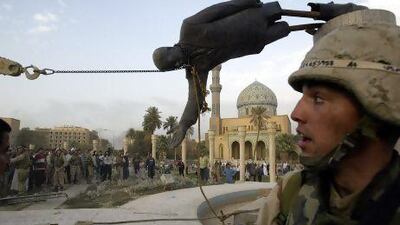LONDON // Ten years ago, a crowd gathered in Firdos Square in Baghdad and pulled down a 12-metre statue of Saddam Hussein.
The event provided perhaps the iconic image of the Iraq invasion, and the day - April 9 - came to mark the end of Hussein's regime.
It also marked the beginning of the process of writing the history of Iraq under Hussein's Baath regime. That remains a controversial undertaking.
In the days and weeks after the fall of Baghdad, occupying US troops seized records from Hussein's palaces, Iraq's ministries of defence and intelligence, as well as Baath party institutions.
As much as 80 per cent of the former regime's documents were spirited away by the US military during those first months of the occupation.
The insight gained into the workings of the Hussein regime from the archive is "truly unique", said Mark Stout, resident historian at the International Spy Museum in Washington and a former intelligence analyst with the US State Department and the Central Intelligence Agency.
Mr Stout had access to hundreds of thousands of pages of the documents as well as transcripts of thousands of hours of covert voice recordings of top-level meetings apparently sanctioned by Hussein himself, copies of which are now stored in digital form at the Conflict Records Research Centre (CRRC) at the National Defence University in Washington.
Their use is controversial, however. Iraq demanded the return of all the original documents in 2008. Then, Saad Eskander, an Iraqi historian and the former the director general of Iraq's National Archives, called the US "the hungriest scavenger" of other nations' archives.
National archives are seen as part of the "cultural property" of a nation. They were first categorised as such in the 1954 Hague Conventions, then more explicitly in the 1977 protocols to the Geneva Conventions.
The United Nations Educational, Scientific and Cultural Organisation (Unesco) describes state archives as "an essential part of the heritage of any national community".
As such, Iraq's archives "should have been kept" in the country, said Saad Jawad, senior visiting fellow at the London School of Economics' Middle East Centre, and a former professor of political science at Baghdad University. In addition to the documents at CRRC in Washington, both Stanford University's Hoover Institution and the University of Colorado house significant collections of Iraqi documents.
In all cases, scholarship on those documents should wait, Mr Jawad suggested, until agreement over their ownership has been reached.
Along with fellow editors Kevin Woods and David Palkki, with whom he produced The Saddam Tapes: The Inner Workings of a Tyrant's Regime 1978-2001, Mr Stout acknowledged the controversy over their use. However, the editors argued in their introduction that state documents were separate from a nation's cultural property in part because of their potential military value. As a result "title passed to the capturing power".
"The editors find that analysing captured state records for historical purposes is consistent with international law and has a lengthy history of precedent in state behaviour."
And scholarship has proceeded at pace since the CRRC was opened in 2008. So far, 17 book-length publications have been published from the cache of Iraqi records at the CRRC, which also houses Al Qaeda documents seized in Afghanistan.
It is a cache, of which only a small amount has been made public - that offers a most complete picture of Hussein, said Mr Stout.
"In the history of totalitarian leaders there is not a lot of audio," he said, pointing out that there are only 11 minutes of private recordings of Adolph Hitler and none of Joseph Stalin. There are more than 2,000 hours of Hussein, however, spanning 15 years, almost the entire time he ruled Iraq.
"This is purely my own speculation. But I think Saddam believed he was a truly historic figure and that these [recordings] were his duty to posterity."
And the recordings, said Mr Stout, show a "very capable" leader.
"He was neither stupid nor crazy. He was very good at what he did, which was to survive in a cut-throat political environment."
He was also acutely aware of political currents in the region, even if he badly miscalculated Iran's ability to withstand an Iraqi attack in 1980 that only ended in a bloody stalemate eight years and hundreds of thousands of lives later.
In a July 1986 discussion with an unidentified male interlocutor, for instance, Hussein showed himself presciently aware of discontent on Arab streets, as well as the growing role of the Muslim Brotherhood and Islamist parties in general.
Noting that Islamists had an advantage in always being able to criticise Arab regimes for not being Islamic enough - "they can say that about any state in the modern age, according to traditional standards" - he also pointed out that they had yet to elucidate their own clear political programme, a disadvantage, he said, in trying to tempt people into revolution.
Pending academic review board approval, the CRRC documents are open to all scholars. But controversy over their use will persist until an agreement is reached with Iraq over legal ownership.
That could take time. When announcing the opening of the CRRC in 2008, Robert Gates, then US secretary of defence, argued they could prove as important to understanding "dictatorial third-world regimes" as the Smolensk files were to US Soviet scholars during the Cold War.
The Smolensk Archive was a trove of documents seized by Nazis from Odessa in the early stage of Germany's invasion of the Soviet Union in 1941 and then seized again by American occupying troops in Bavaria in 1945.
They were not handed back to Russia until 2002. Iraqi scholars will hope that the documents seized from Baghdad will not take quite as long to find their way home.
okarmi@thenational.ae
twitter: For breaking news from the Gulf, the Middle East and around the globe follow The National World. Follow us

